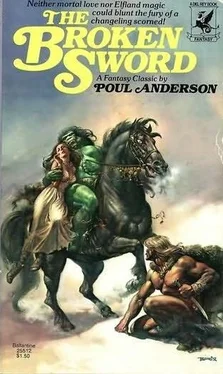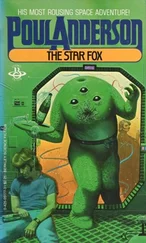Poul Anderson - The Broken Sword
Здесь есть возможность читать онлайн «Poul Anderson - The Broken Sword» весь текст электронной книги совершенно бесплатно (целиком полную версию без сокращений). В некоторых случаях можно слушать аудио, скачать через торрент в формате fb2 и присутствует краткое содержание. Жанр: Фэнтези, на английском языке. Описание произведения, (предисловие) а так же отзывы посетителей доступны на портале библиотеки ЛибКат.
- Название:The Broken Sword
- Автор:
- Жанр:
- Год:неизвестен
- ISBN:нет данных
- Рейтинг книги:3 / 5. Голосов: 1
-
Избранное:Добавить в избранное
- Отзывы:
-
Ваша оценка:
- 60
- 1
- 2
- 3
- 4
- 5
The Broken Sword: краткое содержание, описание и аннотация
Предлагаем к чтению аннотацию, описание, краткое содержание или предисловие (зависит от того, что написал сам автор книги «The Broken Sword»). Если вы не нашли необходимую информацию о книге — напишите в комментариях, мы постараемся отыскать её.
The Broken Sword — читать онлайн бесплатно полную книгу (весь текст) целиком
Ниже представлен текст книги, разбитый по страницам. Система сохранения места последней прочитанной страницы, позволяет с удобством читать онлайн бесплатно книгу «The Broken Sword», без необходимости каждый раз заново искать на чём Вы остановились. Поставьте закладку, и сможете в любой момент перейти на страницу, на которой закончили чтение.
Интервал:
Закладка:
Sprites whirled in the mists about waterfalls; their voices rang back from the dell cliffs. Skafloc could dimly see them, graceful shining bodies haloed with rainbows. Of moonlit nights, drawn by the glow like other denizens of Faerie, they would come out and sit on the mossy banks, naked save for weeds twisted into their hair and garlands of water lilies; and elf children could then talk to them. Much could the sprites tell, of flowing rivers and fish therein, of frog and otter and kingfisher and what those had to say to each other, of sunlit pebbly bottoms and of secret pools where the water lay still and green—and the rush through the falls in a roar and a rainbow, shooting down to cavort in whirlpools!
Other watery places there were from which Skafloc was warned away, quaking bogs and silent dark tarns, for the dwellers were not good.
Often he would be out in the forest to speak with the little folk who lived in it, humble gnomes with grey and brown clothes and long stocking caps and the men’s beards hanging to their waists. They dwelt in gnarly comfort beneath the largest trees, and were glad to see the elf children. But they feared the grown elves, and thought it well that none of these could squeeze into their homes—unless of course by shrinking to gnome size, which none of the haughty elf lords cared to do.
A few goblins were about. Once they had been powerful in the land, but Imric had entered with fire and sword, and those who were not slain or driven elsewhere had been broken of their might. They were furtive cave dwellers now, but Skafloc managed to befriend one and from him got some curious goblin lore.
Once the boy heard a piping far off in the woods, and he thrilled to its eeriness and hastened to the glen from which it came. So softly had he learned to move that he stood before the creature ere it was aware of him. It was a strange being, manlike but with the legs and ears and horns of a goat. On a set of reed pipes it blew an air that was as sorrowful as its eyes.
“Who are you?” asked Skafloc wonderingly.
The creature lowered his pipes, seeming ready to flee, then grew easier and sat down on a log. His accent was odd. “I am a faun,” he said.
“I have heard of no such.” Skafloc lowered himself cross-legged to the grass.
The faun smiled sadly in the twilight. The first star blinked forth above his head. “There are none save me hereabouts. I am an exile.”
“Whence came you hither, faun?”
“I came from the south, after great Pan was dead and the new god whose name I cannot speak was in Hellas. No place remained for the old gods and the old beings of our land. The priests cut down the sacred groves and built churches—Oh, I remember how the dryads screamed, unheard by them, screams that quivered on the hot still air as if to hang there for ever. They ring yet in my ears, they always will.” The faun shook his curly head. “I fled north; but I wonder if those of my comrades who stayed and fought and were slain with exorcisms were not wiser. Long and long has it been, elf-boy, and lonelier than it was long.” Tears glimmered in his eyes. “The nymphs and the fauns and the very gods are less than dust. The temples stand empty, white under the sky, and bit by bit they crumble to ruin. And I—I wander alone in a foreign land, scorned by its gods and shunned by its people. It is a land of mist and rain and iron winters, angry grey seas and pale sunlight spearing through clouds. No more of sapphire water and gentle swells, no more of little rocky islands and the dear warm woods where the nymphs waited for us, no more of grapevines and fig trees heavy with fruit, no more of the stately gods on high Olympus—”
The faun ceased his crooning, stiffened, cocked his ears forward, then rose and bounded into the brush. Skafloc looked around and saw the elf guard approaching to take him home.
But often he was out by himself. He could stand the daylight which the folk of Faerie must shun, and Imric did not await any danger to him from mortal things. Thus he ranged far more around than the other children of Elfheugh, and came to know the land far better than a human might who had lived there for a lifetime.
Of the wild beasts, the fox and the otter were friendliest to elves, it being thought that there was some kind of kinship, and insofar as these had a language the elves knew it. From the fox Skafloc learned the hidden ways of wood and meadow, trails through sun-spattered shade and myriad tiny signs which told a story to one who knew the full use of his senses. From the otter he learned of the world about lake and stream, he learned to swim like his supple teacher and to sneak through cover which would scarce hide half his body. But he got to know the other animals as well. The most timid of birds would come sit on his finger when he whistled in its own tongue; the bear would grunt a welcome when he trod into its den. Deer, elk, hare, and grouse became wary of him after he took up hunting, but with some special ones he made peace. And the story of all his farings among the beasts would be lengthy.
And the years swung by, and he was borne along. He was out in the first shy green of spring, when the forests woke and grew clamorous with returning birds, when the rivers brawled with melting ice and a few little white flowers in the moss were like remnant snowflakes. The summer knew him, naked and brown with flying sun-bleached hair, chasing butterflies uphill toward the sky, rolling back down through the grasses for sheer joy; or out in the light nights which were a dreamy remembrance of day, stars overhead and crickets chirring and dew aglitter beneath the moon. The thunderous rains of autumn washed him, or he wove a crown of flame-coloured leaves and stood in sharp air filled with the calls of departing birdflocks. In winter he flitted among the snowflakes, or crouched under a windfall while storm bellowed and trees groaned; sometimes he would stand on moonlit snowfields and hear the lake ice boom in the cold, a toning that rolled between the hills.
V
When Skafloc’s limbs began to lengthen more swiftly, Imric took him in charge, only a little at first, but more and more with time until he was being raised wholly as a warrior of Alfheim. Being short-lived, humans could learn faster than the people of Faerie, and Skafloc’s knowledge grew with even more haste than his body.
He learned to ride the horses of Alfheim, white and black stallions and mares of an eerie quicksilver grace, quick and tireless as the wind, and erelong his night gallops were taking him from Caithness to Land’s End with the cloven air singing in his ears. He learned the use of sword and spear and bow and axe. He was less fleet and lithe than the elves, but grew to be stronger than any of them and could bear war-gear as many days on end as needful; and as for grace, another mortal man would have been a clod beside him.
He hunted wide over the land, alone or in company with Imric and his followers. Skafloc’s bow twanged death to many a tall-antlered stag;, his spear stopped many a long-tusked boar. There was other and trickier game, chased crazily through the woods and across the crags, unicorns and griffins which Imric had brought from the edge of the world for his pleasure.
Skafloc learned also the manners of the elves, their stateliness and their unending intrigue and their subtle speech. He could dance to harps and pipes in the drenching moonlight, naked and abandoned as the wildest of them. He could himself play, and sing the strange lilting lays older than man. He learned the skaldic arts so well that he talked in verse as easily as in common speech. He learned every language of Faerie and three of man’s. He could discriminate among the rare viands of the elves, the liquid fires which smouldered in spider-shrouded bottles beneath the castle, but for all that his taste for the hunter’s black bread and salt meat, or the rainy sunny earthy savour of berries, or upland springs, was not blunted. After the first soft beard was on his cheeks, he got much heed from the elf women. Without awe of gods, and with few children, the elves knew not wedlock; but their nature was such that their women had more wish for lovemaking and their men less than among humans. Thus Skafloc found himself in great favour, and many a good time did he have.
Читать дальшеИнтервал:
Закладка:
Похожие книги на «The Broken Sword»
Представляем Вашему вниманию похожие книги на «The Broken Sword» списком для выбора. Мы отобрали схожую по названию и смыслу литературу в надежде предоставить читателям больше вариантов отыскать новые, интересные, ещё непрочитанные произведения.
Обсуждение, отзывы о книге «The Broken Sword» и просто собственные мнения читателей. Оставьте ваши комментарии, напишите, что Вы думаете о произведении, его смысле или главных героях. Укажите что конкретно понравилось, а что нет, и почему Вы так считаете.











